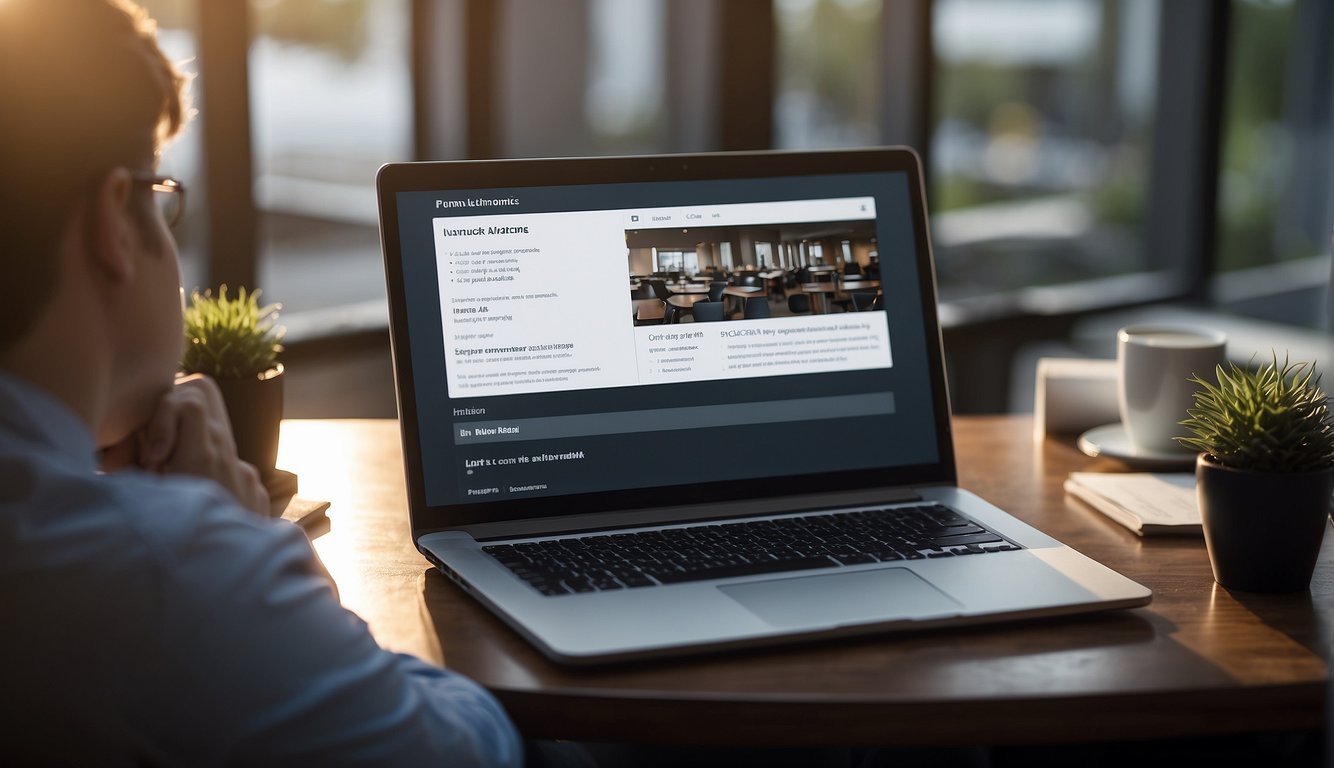Are you an undergraduate student majoring in economics? Are you looking for an opportunity to gain practical experience in your field of study? If so, an internship may be the perfect option for you.

Internships offer students the chance to apply the theories and concepts they have learned in the classroom to real-world situations. They also provide valuable networking opportunities and can help students build their resumes.
In the field of economics, internships can be found in a variety of industries, including finance, government, and non-profits.
While internships can be competitive, there are many resources available to help students find and secure these positions. Your university’s career center is a great place to start, as they often have connections with companies and organizations that offer internships.
Additionally, many professional organizations in the field of economics offer internship programs for undergraduate students.
Table of contents
Understanding Internships

If you are an economics undergraduate student, you might be wondering what internships are and how they can benefit you. Internships are temporary positions that provide practical experience in a particular field or industry. They can be paid or unpaid and can last anywhere from a few weeks to several months.
Types of Internships
There are several types of internships available to economics students, including summer internships, for-credit internships, and external internships.
Summer internships are typically full-time positions that take place during the summer months.
For-credit internships allow students to earn academic credit while gaining practical experience.
External internships are positions with organizations outside of your university.
Benefits for Economics Students
Internships offer several benefits for economics students. Firstly, they provide hands-on experience in a real-world setting, allowing you to apply the theories and concepts you have learned in your coursework. This experience can be invaluable when it comes to securing a job after graduation.
Secondly, internships allow you to network with professionals in your field, potentially leading to job opportunities in the future.
Finally, internships can help you develop important skills such as communication, teamwork, and problem-solving.
Internship Timeline
It’s important to start thinking about internships early on in your academic career. Many internships have application deadlines several months in advance, so be sure to do your research and plan accordingly.
Typically, students start looking for summer internships in the fall or winter of the previous year. For-credit internships may have different timelines, so be sure to check with your academic advisor.
In conclusion, internships are a valuable opportunity for economics students to gain practical experience, network with professionals, and develop important skills. By understanding the different types of internships available, the benefits they offer, and the timeline for applying, you can make the most of this opportunity and set yourself up for success after graduation.
Preparing for Internships

As an Economics undergraduate student, internships can be a valuable opportunity to gain hands-on experience in your field of study. However, landing an internship can be competitive, and preparation is key. Here are some tips to help you prepare for your internship search:
Developing Relevant Skills
To stand out in the competitive internship market, it’s important to develop relevant skills. Consider taking courses in math, statistics, or technology to strengthen your analytical and technical abilities. Learning programming languages like Python can also be a valuable asset in many industries.
Crafting Your Resume
Your resume is often the first impression you make on potential employers. Make sure it’s polished and tailored to the internship you’re applying for. Highlight relevant coursework, skills, and experiences that demonstrate your qualifications for the position. Use bullet points and clear, concise language to make your resume easy to read.
Effective Networking Strategies
Networking can be a powerful tool in finding internships. Reach out to professors, alumni, and professionals in your field of interest. Attend career fairs and events to meet potential employers and learn about internship opportunities. Make sure to follow up with contacts and express your interest in their industry and company.
By developing relevant skills, crafting a strong resume, and utilizing effective networking strategies, you can increase your chances of landing the internship you want. Good luck in your search!
Finding Internship Opportunities

As an economics undergraduate student, finding internship opportunities can be a daunting task. However, with the right resources and approach, you can find suitable internships that will help you gain valuable experience and skills in your field of study.
Utilizing University Resources
Your university’s Department of Economics is a great place to start your search for internship opportunities. The department may have connections with local businesses and organizations that offer internships to students.
Additionally, the department may have a list of previous internship opportunities that students have successfully completed.
Another valuable resource is the Brickell Metcalf Internship Program. This program offers internships to economics undergraduate students and provides them with valuable experience in the field. The program connects students with businesses and organizations in the Chicago area, giving them the opportunity to gain hands-on experience in their field of study.
Exploring External Organizations
Don’t limit yourself to just university resources. There are many external organizations that offer internship opportunities to economics undergraduate students. The Becker Friedman Institute for Economics, for example, offers internships to students interested in economic research. The institute provides students with the opportunity to work with leading economists and gain valuable research experience.
Leveraging Online Platforms
Online platforms such as Handshake can also be a great resource for finding internship opportunities. Handshake connects students with businesses and organizations offering internships and job opportunities. You can search for internships based on your field of study, location, and other criteria.
In conclusion, finding internship opportunities as an economics undergraduate student may seem overwhelming, but with the right resources and approach, you can find suitable internships that will help you gain valuable experience and skills in your field of study.
Utilize university resources, explore external organizations, and leverage online platforms to find the best internship opportunities for you.
Applying to Internships

If you are an economics undergraduate student looking for an internship, the application process can be daunting. However, with the right preparation and approach, you can increase your chances of landing your dream internship. Here are some tips to help you apply to internships successfully.
Writing a Strong Proposal
When applying for internships, most employers will require you to submit a proposal. Your proposal should showcase your skills, knowledge, and experience. Here are some tips to help you write a strong proposal:
- Research the company: Before writing your proposal, research the company you are applying to. This will help you tailor your proposal to the company’s mission and values.
- Highlight your major and economics courses: Your proposal should highlight your major and any economics courses you have taken. This will show the employer that you have the necessary skills and knowledge to excel in the internship.
- Showcase your skills: Your proposal should showcase your skills and how they can be applied to the internship. For example, if you have strong analytical skills, highlight how these skills can be used to analyze data and make recommendations.
- Keep it concise: Your proposal should be concise and to the point. Avoid using jargon and technical terms that may confuse the reader.
Interview Preparation
If your proposal is accepted, you will likely be invited for an interview. Here are some tips to help you prepare for your interview:
- Research the company: Before your interview, research the company and its mission. This will help you understand the company’s culture and values.
- Prepare for common interview questions: Review common interview questions and prepare your answers. This will help you feel more confident during the interview.
- Dress appropriately: Dress professionally for your interview. This will show the employer that you take the internship seriously.
- Be on time: Arrive on time for your interview. This will show the employer that you are reliable and punctual.
By following these tips, you can increase your chances of landing an internship. Remember to be confident, knowledgeable, and clear in your application and interview. Good luck!
Gaining Academic Credit

As an economics undergraduate student, gaining academic credit for your internship can be a great way to enhance your resume and gain valuable experience. Here are some important things to consider when seeking academic credit for your internship.
Understanding Credit Requirements
Before beginning your internship, it is important to understand the credit requirements set forth by your department of economics. The Director of Undergraduate Studies (DUS) can help you understand these requirements and ensure that your internship meets the necessary criteria.
Typically, students are required to work a certain number of hours per week and complete assignments or a final project related to their internship. It is important to keep track of your hours and make sure you are meeting the necessary requirements in order to receive academic credit.
Coordinating with Faculty
In order to receive academic credit for your internship, you will need to coordinate with a faculty member who will oversee your work and assign your grade. This faculty member will also be responsible for approving your internship and ensuring that it meets the necessary requirements.
It is important to communicate regularly with your faculty advisor and keep them updated on your progress throughout your internship. This will help ensure that you are meeting the necessary requirements and that your work is being evaluated fairly.
Overall, gaining academic credit for your internship can be a great way to enhance your academic experience and gain valuable skills and knowledge. By understanding the credit requirements and coordinating with faculty, you can ensure that your internship meets the necessary criteria and helps you achieve your academic goals.
Funding and Stipends

As an economics undergraduate student, you may be interested in pursuing internships to gain valuable experience in your field. However, internships can often come with a financial burden. Fortunately, there are funding and stipend opportunities available to help alleviate this burden.
Searching for Scholarships
One way to fund your internship is to search for scholarships. The Becker Friedman Institute offers a variety of scholarships for undergraduate students interested in pursuing internships. These scholarships can provide financial support to help cover the costs associated with your internship.
Additionally, you may want to explore other scholarship opportunities that are available through your university or external organizations. Be sure to research and apply for scholarships well in advance of your internship start date to ensure that you have enough time to secure funding.
Internship Stipend Opportunities
Another way to fund your internship is to seek out stipend opportunities. The Kapani Metcalf Summer Research Assistant program is one such opportunity that provides stipends to undergraduate students interested in pursuing research internships.
Additionally, many internships themselves offer stipends to their interns. When searching for internships, be sure to inquire about any stipend opportunities that may be available.
Overall, there are a variety of funding and stipend opportunities available to help support your internship experience. By researching and applying for these opportunities, you can pursue your career goals without worrying about financial constraints.
Building a Career in Economics

As an Economics undergraduate student, you have a unique opportunity to build a successful career in a variety of fields. Whether you choose to work in the public or private sector, your economics major internship can provide you with valuable experience that will help you achieve your career goals.
Setting Career Goals
Before you begin your internship, it’s important to take some time to think about your long-term career goals. What kind of job do you want to have? What skills do you need to develop in order to be successful in that job? By setting clear career goals, you can focus your internship experience on developing the skills and knowledge you need to achieve those goals.
Transitioning from Internship to Employment
One of the key benefits of an economics major internship is the opportunity to transition from internship to employment. If you perform well during your internship, you may be offered a full-time position with the company.
Even if you don’t receive a job offer, your internship experience can help you build a strong network of contacts in the industry, which can be invaluable when you begin your job search.
When transitioning from internship to employment, it’s important to be professional and proactive. Make sure you stay in touch with your former employer and colleagues, and continue to develop your skills and knowledge in the field. By maintaining a positive attitude and a strong work ethic, you can build a successful career in economics.
Notable Economics Internship Programs

If you are an economics undergraduate student, you may be wondering where to find internship opportunities that will help you gain valuable experience in your field.
Fortunately, there are many notable economics internship programs available for you to consider.
University-Sponsored Internships
Many universities offer their own economics internship programs, providing their students with opportunities to gain hands-on experience in their field. For example, Columbia University offers its students the opportunity to participate in the Columbia Economics Review, a student-run publication that covers economic issues and events.
The University of Chicago offers its students research assistant positions, allowing them to work with faculty members on research projects and gain valuable experience in the field.
Private and Public Sector Partnerships
In addition to university-sponsored internships, there are many private and public sector partnerships that offer economics internship programs.
Companies such as Goldman Sachs and J.P. Morgan offer internships in their economics and research departments, allowing students to gain experience in financial analysis and market research.
Organizations such as the World Bank and the International Monetary Fund offer internships in international economics, providing students with the opportunity to work on projects that have a global impact.
Overall, there are many notable economics internship programs available for undergraduate students. Whether you are interested in working with a university, a private company, or a public organization, there are many opportunities for you to gain valuable experience in your field.
Research and Analysis Skills

As an economics undergraduate student, developing research and analysis skills is crucial for future success in the field.
This section will cover two important aspects of these skills: working as a research assistant and developing analytical proficiency.
Working as a Research Assistant
One way to gain experience in research and analysis is to work as a research assistant for professors in your department. This can provide valuable hands-on experience in conducting research, analyzing data, and writing reports.
Professors such as Guillaume Pouliot, Anup Malani, and Quentin Vandeweyer are well-known in the field of economics and have extensive research experience. Working as a research assistant for one of these professors can provide you with the opportunity to work on cutting-edge research projects and develop your skills in research and analysis.
Developing Analytical Proficiency
In addition to gaining practical experience as a research assistant, it is important to develop your analytical proficiency as an economics undergraduate student. This can be achieved through coursework, independent research projects, and internships.
Courses such as econometrics, statistics, and data analysis provide a strong foundation in analytical methods. Independent research projects allow you to apply these methods to real-world problems and develop your own research skills.
Internships with companies or organizations that focus on economic research can also provide valuable experience in research and analysis. For example, you could intern with a think tank or a government agency that conducts economic research.
Overall, developing research and analysis skills is essential for success as an economics undergraduate student. Working as a research assistant and developing analytical proficiency through coursework, independent research projects, and internships are all important steps in this process.
